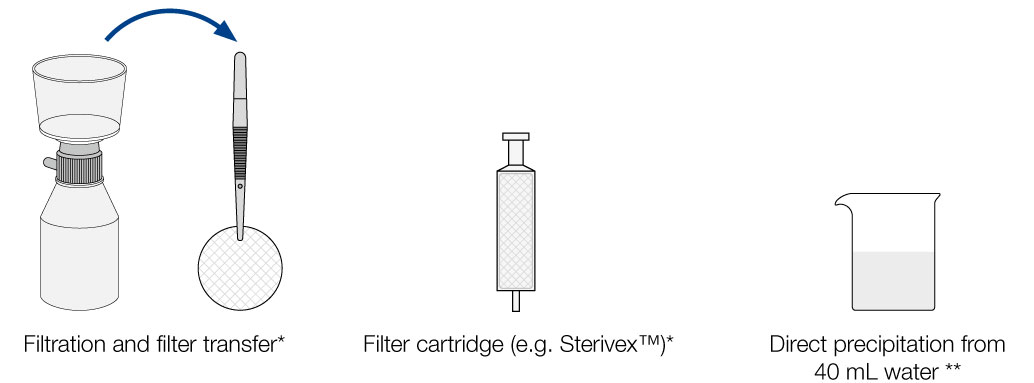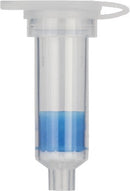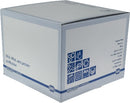Description
For the isolation of eDNA from milliliter to liters of environmental water samples
| Application | Isolation of DNA, Isolation of eDNA |
| Selling unit | 10 Prep(s), 50 Prep(s) |
| Target | DNA |
| CE certified | No, research use only |
| Technology | Silica matrix technology, Silica membrane technology |
| Brand | NucleoSpin |
| Format | XS prep |
| Handling | Centrifugation, Manual |
| Automated use | No |
| Sample material | Filter, Water |
| Sample amount | Several liters of water depending on filtration system, <40 mL unfiltered water |
| Typical yield | Depending on amount and quality of sample |
| Elution volume | 100 µL |
| Preparation time | < 70 min (excluding water filtration) |
| Typical downstream application | NGS, qPCR |
| Storage temperature | 15–25 °C / 59–77 °F |
| Shelf life (from production) | 24 Month(s) |
| Hazardous material | Yes |
NucleoSpin eDNA Water
The NucleoSpin eDNA Water kit enables fast purification of environmental DNA (eDNA) from diverse water samples with reliable results and minimal risk of DNA contamination. eDNA is extracted in less than 70 minutes, avoiding long, over-night incubation steps typical of eDNA extraction workflows. NucleoSpin eDNA Water is compatible with a variety of filters and filtration systems. Furthermore, an alternative protocol for direct eDNA precipitation circumventing filtration is provided.
What is environmental DNA (eDNA)?
eDNA can be described as any DNA released from organisms into the environment (air, water, soil). With regard to water samples, eDNA can be derived from e.g. epithelial cells, excretions, decaying organisms or pieces of tissue, reproductive cells (e.g. sperms, spawn, pollen). Most eDNA is associated with particles, such as cells, organelles, or bound to grains of inorganic or organic material. For this reason, eDNA can be obtained from water samples by filtration.
Purification workflow
*Filtration device and NucleoSpin Filter/ syringe for recovery not included in the kit

eDNA isolation by filtration method with NucleoSpin® eDNA Water
The NucleoSpin eDNA Water kit is intended for the isolation of eDNA from milliliter to liter water samples collected from natural freshwater and marine environments. The following workflow video shows exemplary how to process water samples, filtered with Glass Fiber Filters, with our NucleoSpin eDNA Water kit.
Options for sample pre-processing
 * Filtration devices and filters not included
* Filtration devices and filters not included
** Requires additional buffer PREC
Things to consider for the isolation of eDNA from aquatic ecosystems - tips, tricks, and references
This part of the landing page aims to support all those seeking to isolate eDNA from aquatic ecosystems, e.g. by use of NucleoSpin eDNA Water kit or other methods. It gives tips and tricks to consider and an access to a selected number of references from a fast growing wealth of publications covering technical as well as application aspects of eDNA.
A summary of all information in terms of sampling strategies, storage - transport - conservation, purification method, analysis and quantification of eDNA is described in our TechNote,.
Sampling
Depending on the aim of the investigation planned to do by using eDNA, the following points should be considered:
- Number of samples
- Volume of water per sample or subsample
- Pooling of subsamples
- Longitudinal, cross-sectional, or vertical sectioning of the waterbody
- Season of sampling
Storage – transport – conservation
Several storage and conservation methods have been described.
- Cooling / freezing of water samples
- Drying the filter and storage under desiccante
- Storage in ethanol
- Freezing of the filter
Purification and filter material
Choice of purification method
- Filtration
- Direct precipitation
Filter material
- CN, MEC, RC, glass fiber, PCM, PES
Quantification of eDNA
- Analysis of eDNA by gel electrophoresis
- Quantification of eDNA by spectrophotometry
- Quantification of eDNA by fluorescent methods
- PCR – qPCR
Download Instruction NucleoSpin eDNA Water
Download Technical Note - eDNA isolation from aquatic systems
Download Flyer NucleoSpin eDNA Water
Download Leaflet



